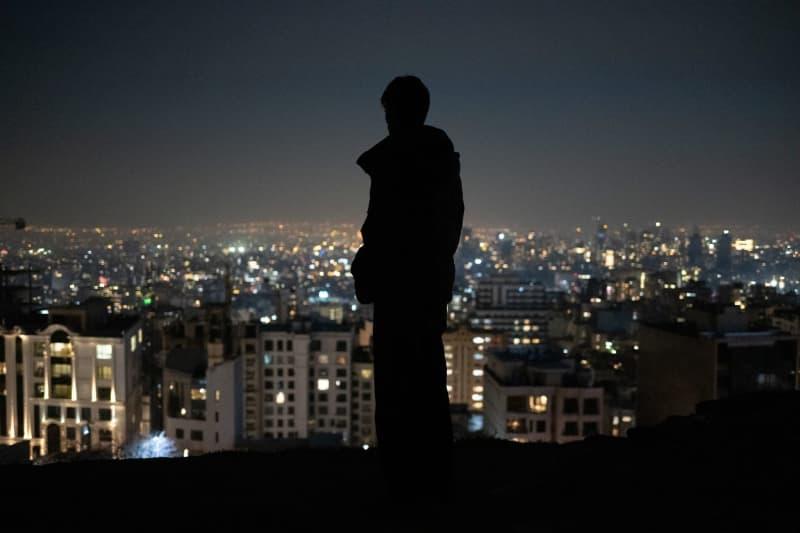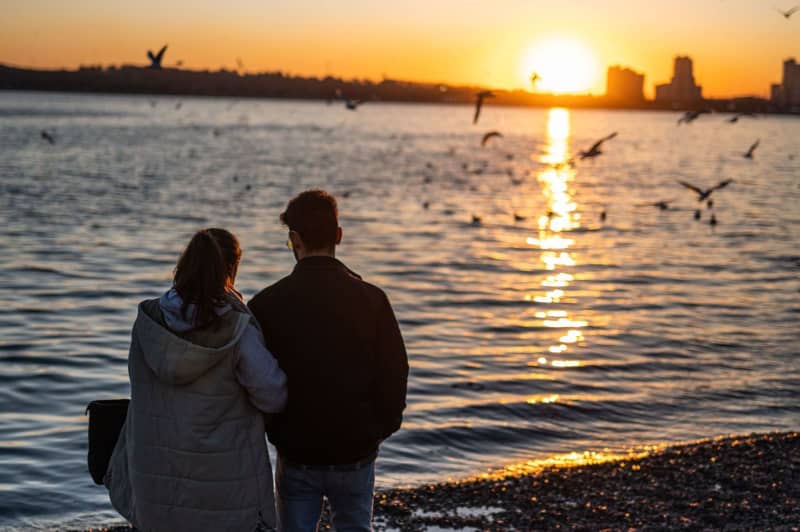Dating is often fraught with its emotional ups and downs, compounded with the difficulty of meeting “the one” and the demands of modern life.
But in the religiously conservative country of the Islamic Republic of Iran, finding Mr or Miss Right can be especially tough.
Those seeking love often have to break the rules – and take risks. Sahar, 35, remembers a time when women were afraid of everything – of the moral guardians and of their families.
“At some point, something changed,” she says. Parents stood up to the police and asked them: “What right do you have to arrest our child? Okay, she was travelling with a boy – so what?”
She says if you want to get to know someone here, you need more than just courage – you need a plan.
Car windows roll down in traffic jams in the metropolis of Tehran – numbers are secretly exchanged, eye contact, a note, then the drivers accelerate.
Dor-Dor, the practice of cruising through the city to get a phone number or just flirt, is just one of many strategies used by young people here to get to know each other.
Others meet in trendy cafés, which function tacitly as places to exchange contact details. Dating apps, on the other hand, are banned, but circumventing internet blocks is part of everyday life for many.
Sahar has made a career as a marketing manager and earns her own salary but finding love remains a challenge.
“When I tried Tinder and Bumble, I just thought: Disaster! These apps aren’t for dating at all, they’re just for sex.”
But she wants a real connection. “Everything has become so superficial,” she says. At the same time, for many people, dating is about something else: financial security.
“The social consensus has always been that the man has to be better off financially,” says Sahar. “But women now have careers, own their own cars, can rent their own flats – and yet there is still this expectation. Despite their success, many women are still looking for a partner who is wealthier than they are.” This makes dating complicated, she says.
Amir, 20, has no major problems with dating. He met his girlfriend at a language course – without “Dor-Dor” or apps.
“I know that a lot of my friends do it, but I think it’s a bit cheap,” he says. His generation, he believes, is freer than it was a few years ago. “At university, nobody cares if couples hold hands anymore.”
But social differences remain: “If you’re travelling in an expensive car, the police ignore you.”
From proposal to ‘white marriage’
In traditional circles, things used to be clearly regulated: If you wanted to live together, you had to get married. The man’s family visited the woman’s, tea was drunk, expectations discussed – Love? Not an absolute necessity. What mattered was that the families harmonized.
Today, more and more couples are living in a “white marriage” – a partnership without a marriage licence. Officially forbidden, but long since commonplace in big cities.
“My mum says: ‘It’s like that everywhere in the world today,’” says Sahar. Her father, on the other hand, thinks it’s a disaster.
Statistics – of which there are few on the subject – confirm the trend. In the capital Tehran, for example, every second marriage ends in divorce. Alongside financial and social expectations, changing lifestyles also play a role.
So “white marriage” is increasingly seen as an alternative, particularly because of the high costs and social obligations of a traditional wedding. However, women often bear the greater disadvantages, as they have neither social security nor legal rights in the event of a separation.
Government incentives for a traditional family
The declining birth rate and social upheavals are also a concern for the government. In 2021, the government under President Ebrahim Raisi passed a law aimed at encouraging young Iranians to marry earlier and have more children. Low-interest loans for newlyweds, longer maternity leave, tax breaks for families – and even a free plot of land from the third child onwards were all on offer.
This is because the birth rate has fallen massively over the years. In 2021, women had just 1.7 children on average – lower than in any other country in West Asia. The government responded with bans. Vasectomies, the sterilization of men, are no longer permitted and abortions, which were barely legal anyway, have been made even more difficult.
And the state dating app Hamdam advertises marriage according to Islamic standards. But success has yet to materialize – demographic change is ahead of politics.
Social change in city and country
Iran’s society is caught between tradition and modernity – a change that is having a profound impact on young people’s love lives.
“Many no longer simply accept the rigid and inflexible state laws and are increasingly making independent decisions about their lives,” says a psychologist from Tehran. She wishes to remain anonymous, but her words are unmistakable: the social upheaval is changing how relationships are formed and lived.
This change gained pace following the nationwide protests after a Kurdish-Iranian woman died in police custody for reportedly improperly wearing her head scarf.
The Woman, Life, Freedom protests that erupted after Mahsa Amini died in September 2022 have accelerated this change.
“On a social level – not a political one – people have become more open and are granting women more freedom,” the psychologist says. Conflicts between young people and their traditional families have decreased noticeably.
“I’m not saying that these problems no longer exist, but their impact has diminished – even in rural areas.”
Concerns about the future influence relationship models
However, while cultural constraints are decreasing, insecurity is growing.
“In a country where the threat of war and uncertainty constantly hovers over the future of young people, many live in a state of permanent fear,” she says. A lack of prospects, exploding rents, financial dependence on the family – for many, the dream of a shared flat or even a family of their own remains out of reach.
As a result, more and more relationships are still fleeting, non-binding and fragmented. “Many relationships end up being limited to short-term encounters,” she says.
Sahar also feels this when planning her future. “You lose the desire and confidence to start a family.”
She pauses for a moment. “They say that the Asian cheetah is also threatened with extinction because it doesn’t reproduce under poor environmental conditions. And that’s exactly how it feels for us – like it’s not the right time to build a new life.”
A couple sits in a popular spot in the northern part of the capital, Tehran. Arne Immanuel Bänsch/dpa

A young man looking for love views the sunset over Tehran. Arne Immanuel Bänsch/dpa
Read the full article here


